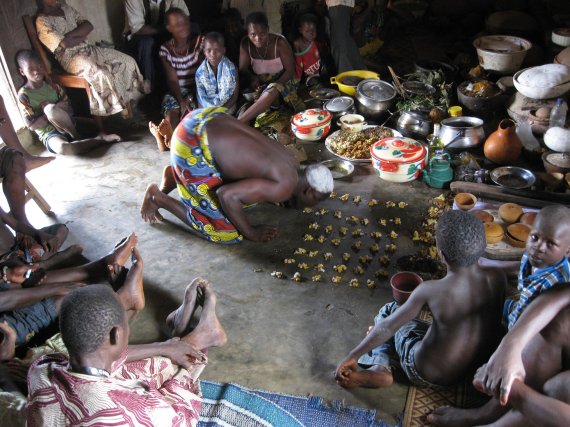Traditional healers may help conserve plant species with religious taboos
Photo: Diana Quiroz
For her PhD research Diana Quiroz, at Bio-systematics, interviewed 102 traditional healers in Gabon and Benin about the fruits, roots and leaves they use in their rituals. She writes about her findings in the Journal of Ethnobiology and Ethnomedicine.
While she did her research, Quiroz spent one and a half years in Benin and Gabon, travelling between communities to talk to healers. Medicine and religious are closely intertwined in the work of these men and women. Healers consult oracles and spirits for diagnoses and then make medicines from plants. Their knowledge is passed on from generation to generation.
In order to win their confidence, Quiroz lived among the locals. ‘So you use an open-air toilet and you wash in the river, just like everyone else.’ Meanwhile she explained that she was not out to copy the medicinal recipes but to protect plant species. This touched a sensitive nerve because the locals have been seeing a decline in plant numbers, thanks to forest felling for example. about 414 plants they use. Taboos or harvesting rules apply to about 63 of the plants. In some cases, a valuable sacrifice must be offered, in others the plants may only harvested at certain spots. Noncompliance is punished from on high with sickness or misfortune.
When Quiroz compared the plants with the international ‘red list’, she found that about 19 percent of the plants were threatened species, as opposed to 7 percent of the remaining plants. Taboos may be a way of managing scarce resources for the community. The correlation is weaker in Gabon, but that supports the hypothesis, as the pressure on forests is much smaller in Gabon, so scarcity is less of an issue. Quiroz says it is too soon to draw firm conclusions about how taboos come about. The research was too limited for that. She does, however, advise nature conservation organizations to start making more use of traditional knowledge. By combining science with traditional knowledge, she can detect downward trends. ‘Traditional knowledge is useful for that as well as being cheap to obtain,’ says Quiroz. And healers are not the only group that is of interest. ‘You can also talk to commercial pickers of medicinal plants and to hunter-gatherers.

